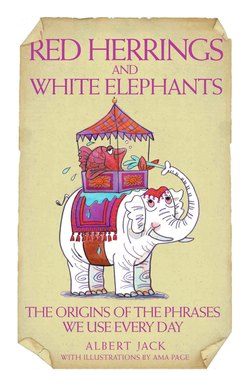Читать книгу Red Herrings & White Elephants - The Origins of the Phrases We Use Every Day - Albert Jack - Страница 6
На сайте Литреса книга снята с продажи.
INTRODUCTION
ОглавлениеIn the course of a day, we all use many examples of what is known as an idiom. Idioms are words and phrases which those of us with a native English tongue take for granted, as we have grown up to recognise their meaning. That is despite the words being used having absolutely nothing to do with the context of a conversation we are having.
For example, if I explained I am writing this preface ‘off the cuff’, you would immediately recognise it as an unprepared piece being written in one take (which, by the way, it is). But why do I call that ‘off the cuff’ when it has nothing to do with my cuffs, much less being either on or off them?
If I suggest everything in this book is absolutely true, I can emphasis that statement by insisting every word in here is ‘straight from the horse’s mouth’. Again, we all know that means it has come directly from the source of information and is therefore reliable. But I haven’t got a horse. I have never spoken to one and unless I can find one that wins more often, even when I hedge my bets, then I might have nothing to do with any of the beasts again.
These phrases appear in conversation all over the English-speaking world every minute of the day and we take them for granted. Have you ever heard someone say they had a bone to pick with you or they could smell a rat? Have you wondered what on earth they were talking about? No, probably not, because we all grow up knowing what these phrases refer to, but, if you were overheard by anyone learning our beautiful language, they’d think we were all mad.
However, have you ever wondered where those phrases come from in the first place and why we use them? I did, when I was sitting in a pub with a friend, who was feeling a little groggy and under the weather, as he had been out painting the town red the previous night. I suggested a hair of the dog was in order and the bar-person, who was an English student from Colombia, and a very good one at that, thought we were crazy. She told us dogs weren’t allowed in the pub. How we all laughed.
It was wintertime, and cold enough to freeze the balls off a brass monkey, so cold, in fact, I believe it was snowing in the ladies. So we sat by the fire, hair of the dog in hand, and started wondering where those sayings originated and why they are so natural to use. The pub’s guv’nor eventually fetched us up a square meal, but we’d been there a while and before we all reached the end of our tethers I decided to leave for home. It was raining cats and dogs outside, so I bit the bullet and made my way through the cold and started researching these little phrases. Within minutes I had discovered that many of them do have traceable origins and some even emerge from a particular event in history. Some are unbelievable but, by and large, many make immediate sense. Some have more than one suggested origin, in which case, I have chosen the source that had the best supporting evidence. Therefore, I can assure the reader, there is only one cock and bull story among them.
It took months of painstaking research, working mainly between the hours of closing time and opening time, before I finally had it in the bag and the fruit of that labour is now in your hand. I know there are many missing idioms (thousands of the rascals, in fact), but we deliberately selected only the best-known sayings with interesting origins. The idea was not to create a definitive dictionary of well-known phrases, but to choose the ones we could have some fun with and those that you, the reader who sent a shilling in my direction, would enjoy.
Thanks to my brilliant illustrator, Ama Page, there are also some top-notch cartoons to help you along the way. If this volume proves to be popular, there will be a second edition to which you are invited to contribute by sending suggestions to info@albertjack.com.
But there is another benefit to reading this book. Everybody loves trivia, but nobody likes a smart Alec. So, the next time you are caught in a corner with somebody talking a load of old codswallop, tell them where that phrase comes from and then start reciting a few of the other shaggy dog tales from this collection. That should get rid of them for you.
